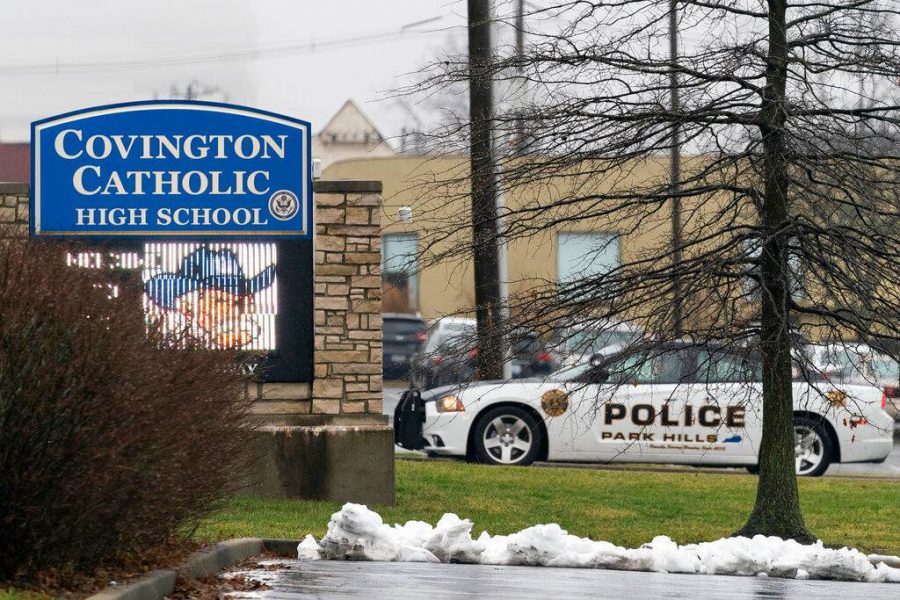The Need for Change in Catholic Schools
Catholic schools need to teach their students to be more inclusive in order to prevent controversies like this from occuring.(Courtesy of Facebook)
By Jack McClatchy
It horrified me to see students jeering and mocking a Native American song with hooting, hollering and tomahawk chops. It horrified me to see subsequent videos where a student claimed, “it’s not rape if you like it.” It horrified me to see students harass women as they walked past a group.
It also horrified me to see conservative media turn the whole affair into who approached whom and a matter of whether the students felt threatened by a group of Black Hebrew Israelites. The latter may be true, but this does not excuse the reactions the students had to a different group of people. It also horrified me to see others call for the end of Catholic education, as if everyone who attends a same-sex Catholic school is misogynistic, racist or homophobic.
This affair did not tell me whether to side with Covington Catholic or Nathan Phillips; but that something fundamental has to change in Catholic education to prevent something like this from happening again.
I attended a high school similar to Covington Catholic: an all-boys Catholic preparatory school in the suburbs of a major city. There was always a contingent of students and faculty that went to the annual March for Life in Washington, which is where this confrontation happened.
Now, I want to make it extremely clear that there isn’t anything inherently wrong with being white, upper-class and conservative. Where problems can emerge is that this demographic grouping can make students unaware of the diversity of our colleges and universities, the workplace and our country in general.
In the worst case scenario, this bubble can result in what we saw this month: a largely white crowd of young men surrounding, mocking and jeering a Native American after being agitated by a hateful group of Black Hebrew Israelites. This isn’t the first time Catholic schools have been in the crosshairs in the past year, either. During the Brett Kavanaugh fiasco, his alma mater Georgetown Prep was scrutinized as a breeding ground for extreme privilege, misogyny and overall chauvinism.
Since the videos first emerged, I wondered what would have been said if students from my high school, instead of Covington Catholic, had been in the video. My high school was most probably more upper-class than Covington Catholic, with a tuition of over $30,000 and an average family income of over $300,000.
I’m not ashamed to have attended Catholic schools for most of my life. In fact, I’m proud to have attended Catholic schools. In light of the past week, I am afraid that Catholic schools and their students have wrongly been smeared because of the highly publicized actions of a few students.
What can be done to prevent something like this from happening in the future?
Catholic schools need to adapt to changing demographics in our country. Among Catholics in the United States, the fastest-growing group is of Hispanic immigrant families according to a 2015 Pew Research study representing 34 percent of Catholics in the US, yet the National Catholic Educational Association reports that only 17.4 percent of Catholic school students are Hispanic.
In Covington Catholic, the numbers are worse, with only 2.2 percent of students being Hispanic according to Niche, which profiles and reviews schools, colleges, and neighborhoods.
Diversity isn’t only a question of race, though. Socioeconomic diversity is at least as important as racial diversity, as classist attitudes can inform racial views. According to Niche, the median income of Park Hills, KY where Covington Catholic is located is $42,227 and the tuition of Covington Catholic is $8,060.
Catholic schools need to allow for greater diversity in their halls to encourage good-faith dialogue and learning across racial, socioeconomic and other barriers.
I am proud of my Catholic education, and wouldn’t have attended any other school in my area. However, something needs to change for Catholic schools before people begin to see every Catholic school student as having racist, classist, misogynist or homophobic views.
And I’m confident that most students don’t hold these views, but collectively we must work to better instill Catholic values of love for self, for God and for others.
Jack McClatchy, FCRH ’21 is a political science major from Wayne, Pennsylvania










































































































































































































